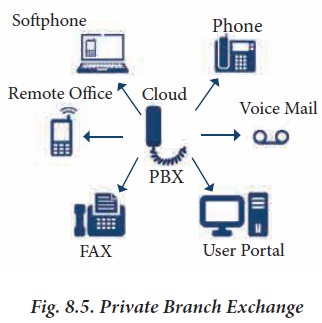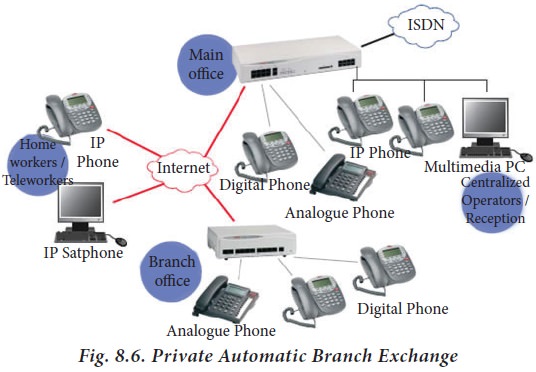Office Secretaryship - Telecommunication Services | 11th Office Management and Secretaryship : Chapter 8 : Secretarial Correspondence
Chapter: 11th Office Management and Secretaryship : Chapter 8 : Secretarial Correspondence
Telecommunication Services
Telecommunication
Services:
The International Subscribers Dialing(ISD):
The
International Subscribers Dialing (ISD) is the overseas equivalent of
Subscribers Trunk Dialing (STD). A code number is given to each country. The
country number, the area code number and the customer number are dialed to get
the connection. Communication is possible throughout the world. Currently
mobile phones have made International Calls much easier and cheaper due to
competition among service.
PBX (Private Branch Exchange):
A
manually or automatically operated telephone facility that handles
communications within an office, office building, or organization and that is
connected to the public telephone network.
A
PBX (Private Branch Exchange) is a telephone system within an enterprise that
switches the calls between enterprises users on local lines while allowing all
users to share a certain number of external phone lines. The main purpose of a
PBX is to save the cost of requiring a line for each user to the telephone
Company’s central office.
The
PBX is owned and operated by the enterprise rather than the telephone company
(which may be a supplier or service provider, however). Private branch
exchanges used analog technology originally. Today PBXs use digital technology
(digital signals are converted to analog for outside calls on the local loop
using plain old telephone service (POTS). Essentially a PBX is a telephone
switch used by organizations and businesses. This device functions in the same
manner as a traditional telephone switch board but is scaled down to
accommodate business settings.
A
PBX includes:
·
Telephone
Trunk (Multiple Phone) lines that terminate at the PBX.
·
A
Computer with memory that manages the switching of the calls within the PBX and
in and out of it.
·
The
network of lines within the PBX
·
A
console or switch board for a human operator (optional).
Modern
PBXs are built around a small computer, and some of them can be connected to a
server for additional services such as call management, call detail reports,
telemarketing etc.,

The
functions of a PBX are the following:
·
Provide
one single number that external callers can use to access all persons in a
company.
·
Distribute
calls to employees in an answering team in an even way: using the Automatic
Call Distribution (ACD) feature.
·
Automatic
call answering machine offers a menu of options from which a user can select to
be directed to a specific extension or department.
·
Allow
the use of customized business greetings while answering calls.
·
Provide
system call management features.
·
Place
external callers on hold while waiting for a requested person to answer, and
playing music or customized commercial messages for the caller waiting.
·
Record
voice messages for any extension from an external caller.
·
Transfer
calls between internal extensions.
(PABX) Private Automatic Branch Exchange:
A
Private automatic branch exchange (PABX) is an automatic telephone switching
system within a private enterprise. Originally, such systems called Private
Branch Exchanges (PBX) required the use of a live operator. Since almost all
private branch exchanges today are automatic, the abbreviation “PBX” usually
implies a “PABX”.
Benefits of PABX Systems:
PABX
systems also known as E PABX or PBX, are widely used nowadays offices, hotels,
various industries where there is requirement of intra-office communication
between departments or otherwise, PABX is a must. No modern office can be
thought of without PABX.
There
are many benefits for having a PABX in an office. The nature of benefits may
vary from one industry to another. Lists of some benefits which may be
applicable across any industries:
1. Sharing of Resources:
One
of the major benefits of having PABX is sharing of telecom resources. Usually,
any office which has few PSTN (Public Switched Telephone Network) lines needs
to be shared among many people in the office. PABX systems help sharing those
limited number of PSTN connections PABC has PSTN Connectivity at one end, and
many extension lines at the other end, which are given to many persons, various
rooms, and tables.
When
outsiders can call up those PSTN numbers and reach many extensions directly or
by the help of an operator. Employees can also make outgoing calls from his
chain directly by accessing PSTN line from his extension or through an
operator.
2. Internal Office Calls and Call Transferring:
PBX
enables the employees to communicate with each other within the organizations.
Previously, officials used a bell and used to kick around an office peon to
call someone. Now with the invention of the PABX can call employee through
intercom whenever needed.

Related Topics